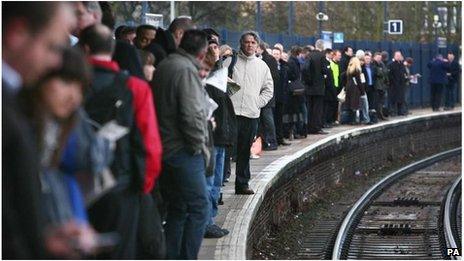National Passenger Survey: Rail satisfaction at record high
- Published
- comments

More than 31,500 travellers were interviews for the Passenger Focus survey
The number of passengers satisfied with their rail journey is at a record high but fewer than half of people think ticket prices are worth the money, a Passenger Focus survey says.
The 85% satisfaction levels in autumn 2012 are a record since the survey began in 1999.
But only 47% were satisfied with their ticket's value for money, compared with 46% the year before.
The National Passenger Survey surveyed 31,626 travellers.
The research was conducted between 1 September and 12 November 2012, with "top-up" interviews carried out within the last three weeks. People were asked for their opinion on the journey they were taking on that day.
The satisfaction levels stood at 84% in autumn 2011.
Anthony Smith, chief executive officer for Passenger Focus, said that while "things are moving in the right direction" more needed to be done to improve rail services.
"There are some trains that are very crowded, there are some routes that are very crowded that are desperately crying out for more investment in terms of more trains and longer trains.
"Quite a bit of that is in the pipeline and it will come at some point in the future.
"This is an average picture, it doesn't reflect every single passenger's experience but I think it does show the industry is starting to broadly move in the right direction."
Fare pricing
With regard to the low number of passengers satisfied with their ticket's value for money, Mr Smith said: "We've had years now of above-inflation fare rises.
"We've now got a government promise to row these fare rises back so that they're pegged at inflation only. The sooner that promise becomes a reality the better."
The number of those satisfied with the amount of room for all passengers to sit or stand went up 1% to 69% compared with autumn 2011.
The report also says passenger satisfaction with punctuality and reliability has risen 2% to 83%, a level only achieved once before, in autumn 2009.
For the long distance operators the proportion of passengers who were very or fairly satisfied overall was 89% - this figure was 86% in autumn 2011.
For regional operators, 86% of passengers were very or fairly satisfied with their journey overall, a drop of 1% from last year when 87% were satisfied.
The lowest ratings for overall satisfaction were given to Northern Rail (80%), First Capital Connect (81%) and Southern (82%) while Greater Anglia, First Great Western and London Midland all had 83% of passengers satisfied.
The highest ratings for overall satisfaction were achieved by Grand Central (96%), First Hull Trains (95%), and Heathrow Connect (94%) while Heathrow Express, c2c, and London Overground all had 93% of passengers satisfied.
Railway 'success'
Bruce Williamson, of campaign group Railfuture, said he was not surprised that rail satisfaction levels were high.
"Since privatisation, train companies have slowly got their act together. Punctuality, for example, seems to be improving.
"But the two main bug bears remain congestion and fare levels. We know there's huge dissatisfaction with fares because we have the highest fares in Europe."
Mr Williamson said fares needed to come down in "real terms" because "Having fare rises at the rate of inflation just maintains the status quo."
Michael Roberts, chief executive of the Association of Train Operating Companies, said the report was "further evidence of the success of today's railway".
"The report's strong results include significantly improved scores in satisfaction with services, stations and dealing with delays. These are a testament to the industry's hard work and major government investment in rail.
"We recognise there is still much to be done. Train companies are working with Network Rail on a long-term programme to continue improving services and to deliver better value for passengers and taxpayers alike."
- Published26 January 2012
- Published29 June 2011
- Published26 January 2011